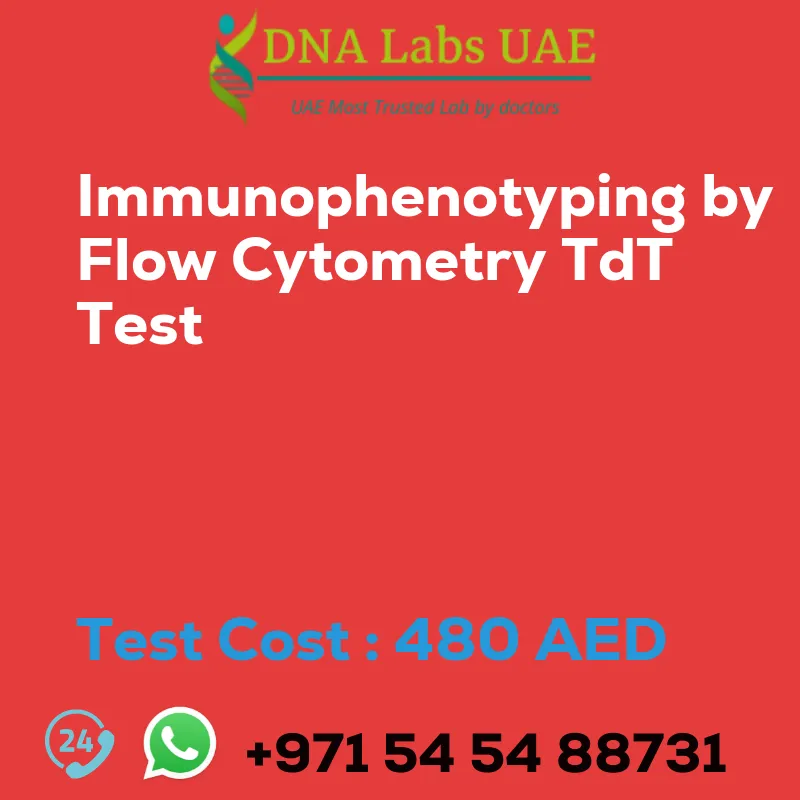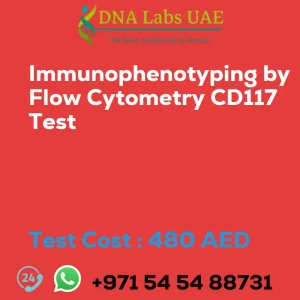IMMUNOPHENOTYPING BY FLOW CYTOMETRY TdT Test
Test Details
The TdT (Terminal deoxynucleotidyl transferase) test is a flow cytometry-based immunophenotyping assay used to detect the presence of TdT enzyme in cells. TdT is an enzyme that adds nucleotides to the ends of DNA strands during V(D)J recombination, a process that occurs during the development of T and B lymphocytes.
The TdT test is commonly used in the diagnosis and classification of lymphoid malignancies, such as acute lymphoblastic leukemia (ALL). In normal lymphoid cells, TdT expression is restricted to early precursor cells, while mature lymphocytes do not express TdT. However, in certain lymphoid malignancies, TdT can be aberrantly expressed, providing important diagnostic information.
The TdT test involves staining cells with fluorescently labeled antibodies specific for TdT. The cells are then analyzed using flow cytometry, a technique that allows for the simultaneous analysis of multiple parameters on individual cells. By measuring the fluorescence intensity of the TdT antibody, flow cytometry can determine the presence or absence of TdT in the analyzed cells.
The TdT test is typically performed on bone marrow or peripheral blood samples. It can help distinguish between different types of lymphoid malignancies and can be used in combination with other immunophenotyping markers to provide a more comprehensive characterization of the disease.
Overall, the TdT test is a valuable tool in the diagnosis and classification of lymphoid malignancies, providing important information about the stage and type of the disease.
Test Name
IMMUNOPHENOTYPING BY FLOW CYTOMETRY TdT Test
Components
Price: 480.0 AED
Sample Condition
- 3 mL (2 mL min.) whole blood in 1 Lavender Top (EDTA) tube
- 3 mL (2 mL min.) whole blood in 1 Green Top (Sodium Heparin) tube OR 2 mL (1 mL min.) Bone marrow in 1 Green Top (Sodium heparin) tube
- Ship immediately at 18-22°C. DO NOT REFRIGERATE OR FREEZE.
- Specify time, date, and clinical details on the test request form.
Report Delivery
Sample: Daily by 9 am
Report: Same day
Method
Flow Cytometry
Test Type
Cancer
Doctor
Oncologist, Hematologist
Test Department
FLOW CYTOMETRY
Pre Test Information
Give brief clinical history.
| Test Name | IMMUNOPHENOTYPING BY FLOW CYTOMETRY TdT Test |
|---|---|
| Components | |
| Price | 480.0 AED |
| Sample Condition | 3 mL (2 mL min.) whole blood in 1 Lavender Top (EDTA) tubeAND 3 mL (2 mL min.) whole blood in 1 Green Top (Sodium Heparin) tube OR 2 mL (1 mL min.) Bone marrow in 1 Green Top (Sodium heparin) tube. Ship immediately at 18\u0192??22?\u00f8C. DO NOT REFRIGERATE OR FREEZE. Specify time, date and clinical details on test request form. |
| Report Delivery | Sample Daily by 9 am; Report Same day |
| Method | Flow Cytometry |
| Test type | Cancer |
| Doctor | Oncologist, Hematologist |
| Test Department: | FLOW CYTOMETRY |
| Pre Test Information | Give brief clinical history. |
| Test Details |
The TdT (Terminal deoxynucleotidyl transferase) test is a flow cytometry-based immunophenotyping assay used to detect the presence of TdT enzyme in cells. TdT is an enzyme that adds nucleotides to the ends of DNA strands during V(D)J recombination, a process that occurs during the development of T and B lymphocytes. The TdT test is commonly used in the diagnosis and classification of lymphoid malignancies, such as acute lymphoblastic leukemia (ALL). In normal lymphoid cells, TdT expression is restricted to early precursor cells, while mature lymphocytes do not express TdT. However, in certain lymphoid malignancies, TdT can be aberrantly expressed, providing important diagnostic information. The TdT test involves staining cells with fluorescently labeled antibodies specific for TdT. The cells are then analyzed using flow cytometry, a technique that allows for the simultaneous analysis of multiple parameters on individual cells. By measuring the fluorescence intensity of the TdT antibody, flow cytometry can determine the presence or absence of TdT in the analyzed cells. The TdT test is typically performed on bone marrow or peripheral blood samples. It can help distinguish between different types of lymphoid malignancies and can be used in combination with other immunophenotyping markers to provide a more comprehensive characterization of the disease. Overall, the TdT test is a valuable tool in the diagnosis and classification of lymphoid malignancies, providing important information about the stage and type of the disease. |








